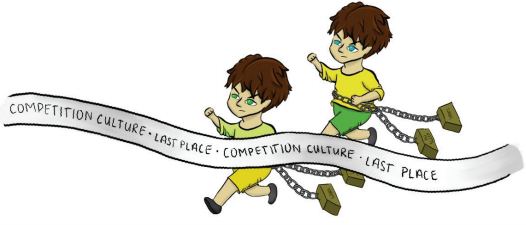Students lose sleep over competition
After a couple hours of doing homework, you look at the time: It’s 12 a.m. and you’re ready for bed. You wake up groggy and tired, but you somehow manage to make it to school on time for AP Physics and see your friend waiting at the door.
“Man, I did so much homework last night. I’m already done with today,” you complain. Immediate regret fills your mind as you already know what’s about to happen. “Oh, you think that’s bad? I had 48 hours worth of homework and I went to bed at…’’ you’ve already stopped listening.
There seems to be an issue where some students try to make a competition about how terrible school has made their lives. For example, a student may brag to another that they haven’t slept in an unhealthy amount of time and that they have several hours of homework every night.
This mindset seems to be a byproduct of the competitive culture at our school. Ashley Murphy (11) said she has encountered the competitive mindset before. “I do have friends like that who stay up really late, but I always yell at them to sleep because sleep is important,” Murphy said. Murphy’s friends’ experience is a common one, as those with this mindset usually do not get enough sleep.
The 2018 Illinois Youth Survey from our school recorded that more than 50 percent of students from all grades get less than the recommended amount of sleep each night. Nationwide Children’s Hospital makes it clear that the healthiest amount of sleep for teens is at least nine hours per night. Tara Nieves has seen first hand from her students the effects of sleep deprivation as this competitive mindset becomes more common.
“I’ve seen students who are sick for three to four weeks straight. That can’t be because it’s the same cold, it’s cause they can’t get their immune system back up to fight that off because they are not sleeping,” Nieves said. In essence, the competitive nature of staying up late to finish homework might make a student seem like they care and put more effort into their lives than their peers, but it actually just hurts them physically and makes them compete more with other students.
Anjali Parande (11) said her peers will come up to her just to ask what grade she got on a test or project, and the student will then become excited if they get a higher grade and exclaim “I beat Anjali!”
“I think things like that compound your competitiveness, because then you’re not competing with just yourself, but you’re competing with other people, and then you’re like ‘oh shoot now I need to get the best grade,’” Parande said.
Ms. Nieves suggested that the deeper reason for this behavior may be that students think that being the hardest worker and best competitor will get them into a better college.
“What’s happening right now is not going to determine whether you’re a success or not, and I think that everybody is looking at every possible thing and thinking, ‘I’m a success because I’m getting less sleep so I care more,’” Nieves said. “It’s great to have goals, but I think when it affects them as far as their health, social abilities and such, it makes me sad, or it scares me. It’s detrimental.”

